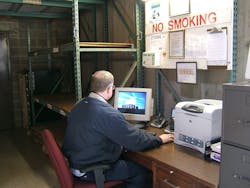As fleets continue to rely more heavily on data and digital connections to more effectively manage their operations – as well as serve customers – information technology (IT) specialists believe more electronic backup and protection planning needs to be conducted.
“If your data center gets compromised by hackers, a power outage, or a natural disaster such as a hurricane, how long can you afford them to be ‘down’? In an industry like trucking that’s becoming more and more dependent on any number of IT applications, that’s the critical question,” Chris Cooley, VP-service design and realization for Sungard Availability Services, explained to Fleet Owner.
The key piece of that puzzle, though, is time, he said. “Every IT application used by a trucking firm isn’t the same in terms of necessity, so the backup and protection systems shouldn’t be the same for each either,” Cooley noted.
For an example, applications that process loads and freight bills usually can’t be down more than a few hours, so “data replication” that can involve “mirroring” that information on a real-time basis for fast-paced recovery might be required, he said.
Payroll systems, on the other hand, usually can be offline for up to 48 hours since they are used only intermittently, so a less-costly data replication scheme can be deployed, Cooley added.
“The key metrics are ‘time’ and ‘application objective’ when contemplating protection services,” he explained. “The questions you need to ask are how a system going down will affect your operation and what revenue or reputational losses such downtime could incur.”
Cooley stressed, though, that most IT outages are not the result of what he dubbed the “biblical events” such as massive floods, hurricanes, and the like. “Those are rare and if they do occur are often localized, affecting only specific areas,” he said. “Human error is actually the biggest factor, following by external attacks by hackers and the like.”
The upshot, Cooley emphasized, is that today’s supply chains are controlled and managed via digital connections, not the paperwork used extensively 15 years ago.
“While the digital transaction volumes for industries such as retail and healthcare are far, far higher compared to trucking, the importance and value of those transactions can oftentimes be equal,” he pointed out.
“For example, if a trucking IT system failure creates a delivery failure for an automotive plant, it could cause a stoppage for the factory – leaving an automaker very unhappy with you,” Cooley said. “And the financial impact of such a reputational loss might continue o some time, as they will remember your carrier was the one that failed to make a critical delivery.”
About the Author
Sean Kilcarr
Editor in Chief
Sean Kilcarr is a former longtime FleetOwner senior editor who wrote for the publication from 2000 to 2018. He served as editor-in-chief from 2017 to 2018.
